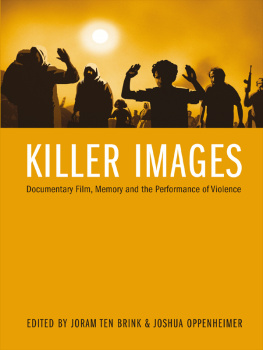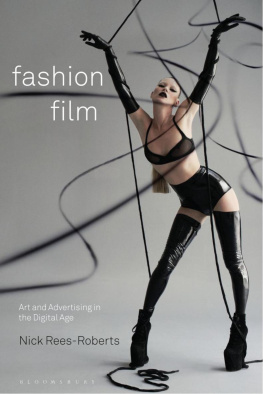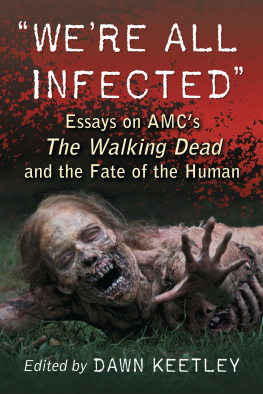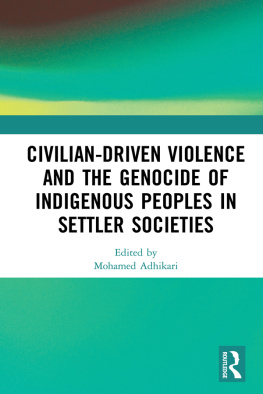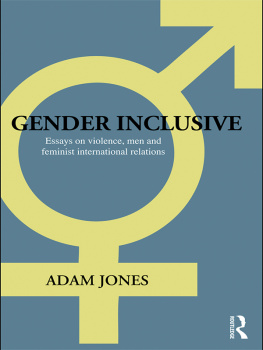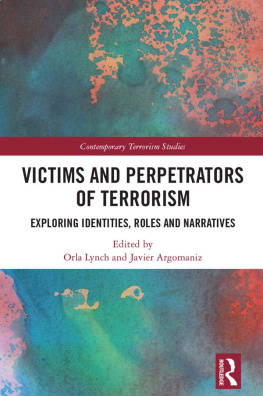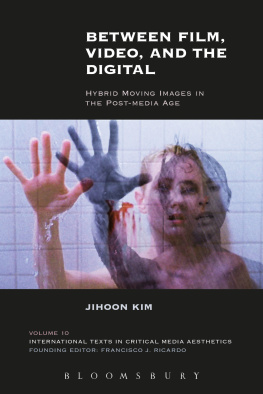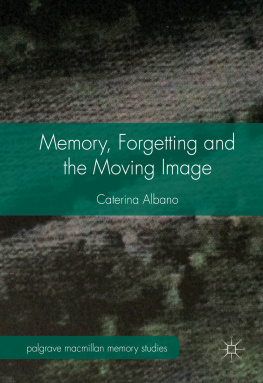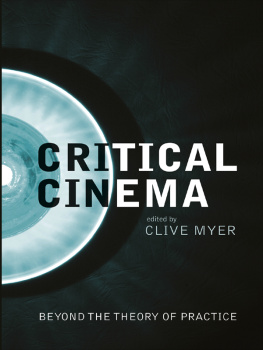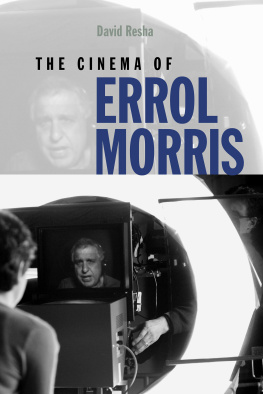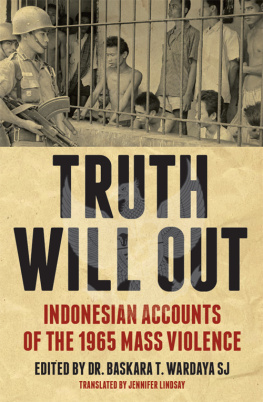KILLER IMAGES
Nonfictions is dedicated to expanding and deepening the range of contemporary documentary studies. It aims to engage in the theoretical conversation about documentaries, open new areas of scholarship, and recover lost or marginalised histories.
General Editor, Brian Winston
Other titles in the Nonfictions series:
Direct Cinema: Observational Documentary and the Politics of the Sixties by Dave Saunders
Projecting Migration: Transcultural Documentary Practice edited by Alan Grossman and Aine OBrien
The Image and the Witness: Trauma, Memory and Visual Culture edited by Frances Guerin and Roger Hallas
Films of Fact: A History of Science in Documentary Films and Television by Timothy Boon
Building Bridges: The Cinema of Jean Rouch edited by Joram ten Brink
Vision On: Film, Television and the Arts in Britain by John Wyver
Chavez: The Revolution Will Not Be Televised A Case Study of Politics and the Media by Rod Stoneman
Documentary Display: Re-Viewing Nonfiction Film and Video by Keith Beattie
The Personal Camera: Subjective Cinema and the Essay Film by Laura Rascaroli
The Cinema of Me: The Self and Subjectivity in First Person Documentary by Alisa Lebow
KILLER IMAGES
Documentary Film, Memory and the Performance of Violence
EDITED BY
JORAM TEN BRINK & JOSHUA OPPENHEIMER
 | WALLFLOWER PRESS LONDON & NEW YORK |  |
A Wallflower Press Book
Published by
Columbia University Press
Publishers Since 1893
New York Chichester, West Sussex
cup.columbia.edu
Copyright Joram ten Brink & Joshua Oppenheimer 2012
All rights reserved.
E-ISBN 978-0-231-85024-7
Wallflower Press is a registered trademark of Columbia University Press.
A complete CIP record is available from the Library of Congress
ISBN 978-0-231-16334-7 (cloth : alk. paper)
ISBN 978-0-231-16335-4 (pbk. : alk. paper)
ISBN 978-0-231-85024-7 (e-book)
Design by Elsa Mathern
A Columbia University Press E-book.
CUP would be pleased to hear about your reading experience with this e-book at .
CONTENTS
The genesis of this volume is the UK Arts and Humanities Research Council-supported research project Genocide and Genre, awarded to us through the University of Westminster. At the core of the project was the making of the film The Act of Killing (2012) which, alongside the present volume, examines cinemas unique position in exploring both the routines of violence as well as the rhetoric and imagination that begets violence. The film and the critical reflections in turn grew out of the explorations of the filmmaking collective Vision Machine Film Project. To Vision Machine collaborators Christine Cynn, Andrea Zimmerman and Michael Uwemedimo, words cannot express our debt. Also, deserving special mention is The Act of Killings lead producer, Signe Byrge Srensen.
At the University of Westminster, special thanks must be offered to Rosie Thomas and Peter Goodwin who have been a reliable source of encouragement and guidance throughout.
We owe special gratitude to Alisa Lebow, who, in addition to contributing to this volume, offered numerous useful suggestions about its form.
We are grateful to innumerable colleagues academics and filmmakers for their support, inspiration and advice over the three years we have been preparing this book. We would also like to thank the Goethe Institute in London and Birkbeck College of the University of London for hosting several of the events that contributed to the production of this volume.
We cannot praise enough the hard work and dedication of Lia Naama ten Brink in transcribing and editing the interviews in this volume through the different stages of the books development. She offered endlessly inspiring and wise insights throughout the process. It is fair to say there would be no book without her help. We would also like to thank the tireless efforts of Yoram Allon and Jodie Taylor of Wallflower Press in bringing this book to print. And, of course, last but not least, to all the contributors to this volume, for their insight, original research and patience, a very, very special thank you.
Joram ten Brink & Joshua Oppenheimer
September 2012
BENEDICT ANDERSON, Aaron Binenkorb Professor of International Studies, Emeritus, Cornell University. Citizen of Ireland. Specialist on the history and politics of Indonesia, Thailand and the Philippines. Banned from Indonesia between 1972 to 1999. Author of Java in a Time of Revolution (1972), Imagined Communities (1983), Language and Power (1992), The Spectre of Comparisons (1998), Under Three Flags (2005), among other works. Founder and long-time editor of the journal Indonesia.
JORAM TEN BRINK is a filmmaker and Professor of Film at the University of West-minster, London, where he is also director of Doc West, the Centre for Production and Research of Documentary Film. His films have been broadcast and theatrically released internationally, and his work has been screened at the Berlin and Rotterdam film festivals and at MoMA in New York. His previous publications include, as editor, Building Bridges: The Cinema of Jean Rouch (2007).
STPHANIE BENZAQUEN is an art historian and curator. She is currently a PhD candidate at the Centre for Historical Culture, Faculty of History and Arts, Erasmus University Rotterdam. She gained her MA in Art History at the Sorbonne University in Paris. Since 1999, she has organised projects and exhibitions in Israel, Central and Eastern Europe, Russia, France and Thailand.
MICHAEL CHANAN is a documentarist, author of numerous books on both film and music, and Professor of Film & Video at the University of Roehampton, London. In the 1980s, he shot a number of films in Cuba and Latin America, most of them for Channel Four, and published the first edition of his history of Cuban Cinema. He first became involved in Latin American cinema when he curated a retrospective of new Chilean cinema in London in 1976, and recently renewed his interest in that country with Three Short Films About Chile, shot in 2011. He blogs as Putney Debater.
ARIEL HERYANTO is Associate Professor of Indonesian Studies and Head of Southeast Asia Centre, The Australian National University. He is the author of State Terrorism and Political Identity In Indonesia: Fatally Belonging (2007), and editor of Popular Culture in Indonesia: Fluid Identities in Post-Authoritarian Politics (2008).
THOMAS KEENAN teaches literature and human rights at Bard College, New York, where he directs the Human Rights Project. He is the author of Fables of Responsibility (1997), co-editor of New Media, Old Media (2005) with Wendy Chun, and co-author, with Eyal Weizman, of Mengeles Skull (2012).
ALISA LEBOW is a Reader in Film Studies at the University of Sussex. Her research is generally concerned with issues related to documentary film, recently to do with questions of the political in documentary. Her books Cinema of Me (2012) and First Person Jewish

